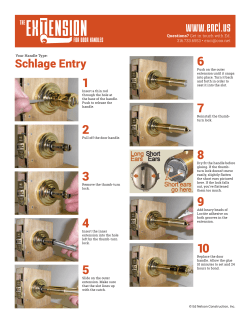
Homework #2 - Penn State Harrisburg Math/Computer Sciences
CMPSC 312 Computer Organization and Architecture Penn State Harrisburg, Spring, 2015 Homework #2 - 30 points Due 4/1/15 in W251 Olmsted at 6:00 PM You have been hired by a security company to design a circuit for a digital combination lock. The input for the lock consists of four input lines, one each for 2^0, 2^1, 2^2, and 2^3; thus enabling hexadecimal input of 0 through F. The output is a single input for the lock mechanism which opens when its input is high. Use a Logisim "input" to supply the clock pulse. This is a circuit that has to remember "state"; thus, the inputs will need to be stored as they are entered. The validity of the combination is determined only after all three entries are made-- just like a real combination lock. In order to make its lock as cheaply as possible, the company has specified that all of their locks will open when the same sequence of digits is entered: 5-A-716. Thus, when the input sequence is 5 - A - 7, the "open" output goes high. The high "open" output will (for now) simply light an LED. The hardwired combination shall be stored in a set of D flip-flops so that the flip-flops can be reprogramed at a later time. You should make a reasonable effort to minimize the circuit. (Remember, we're on a budget!) Be very careful to get the correct function for your inputs before simplifying and designing the circuit with Logisim. Your inputs and output should be labeled (in Logisim, not by hand). Place your name(s) on the hardcopy of the circuit. When your circuit has been designed and tested using Logisim, mail a copy of the final circuit (.circ) file to jlobur@psu.edu. Homework received after 6:00 PM on April 1, 2015 will receive half credit. Homework received after 6:00 PM on April 8, 2015 will receive no credit. Note: This project will use only standard combinational and sequential components as illustrated in your book and discussed in class. Do not use any other gates. Projects that employ nonstandard gates will be subject to penalty points. If you have any confusion about this requirement, ask! For full credit: • The sequence 5 - A - 7, entered through the 4 inputs will light an LED that signifies the lock is open. The LED will be unlit otherwise. • After three digits have been entered-- and only after three digits have been entered -- the lock either opens or resets to permit entry of the first digit again. This happens automatically, without any additional user input. • The circuit uses only standard combinational and sequential logic components • The circuit is well documented to include the names of all project participants, component labels, and input/output labels. • The circuit is received via e-mail and hardcopy on 4/1/15 by 6:00 PM. For 5 points extra credit: Provide the lock with a reset input so that the user can "start over" after entering the first or second digits. For example, the user enters 6 (0110), clicks the "clock" input and then realizes that the first digit should be 5 (0101). He can press the reset (and then the clock input) to start over. You will be graded on the professionalism of your submission as well as its function. Neatness and the appropriate use of labels is expected. Do not wait till the last minute to begin work on this assignment!
© Copyright 2025














